Mosquito control is a global priority due to their role as disease vectors. Understanding their breeding in stagnant water and behavioral patterns is key for effective management. Traditional repellents may lose effectiveness and carry health risks, prompting a shift towards eco-friendly strategies like biological controls, habitat management, and targeted repellents (e.g., citronella, lavender, lemon balm essential oils). Modern innovations include ultrasonic devices, electric nets, and topical creams with DEET or picaridin. Community-based strategies focus on eliminating breeding grounds through collective action, waste disposal education, and neighborhood clean-ups to enhance public health and quality of life.
Mosquitoes pose a significant health concern worldwide, transmitting diseases like malaria, dengue, and Zika. Understanding their behavior and breeding patterns is crucial for effective mosquito control. This article explores a comprehensive range of mosquito repellent treatments, from traditional pesticides and sprays to natural solutions, innovative technologies, targeted topical creams, and community-based strategies. Discover how these methods work together to combat these pesky vectors and reduce the risk of mosquito-borne diseases.
Understanding Mosquitoes: Behavior and Breeding Patterns

Mosquitoes are more than just a nuisance; they are vectors for various diseases, making mosquito control a critical public health concern worldwide. Understanding their behavior and breeding patterns is essential in implementing effective mosquito repellent treatments. These tiny insects breed in stagnant water, with female mosquitoes laying their eggs in ponds, marshes, or even small collections of water in containers. This breeding cycle can be rapid, leading to a surge in mosquito populations in specific areas. Their active feeding times often coincide with dawn and dusk, when they seek out warm-blooded hosts for nourishment.
Mosquitoes are highly attuned to their environment, using visual cues, carbon dioxide emissions, body heat, and scent to locate potential prey. This remarkable sensitivity makes traditional repellents less effective as mosquitoes can become desensitized over time. Therefore, a multi-faceted approach is required for mosquito control, including eliminating breeding sites, using environmental modifications, and employing targeted treatments to disrupt their feeding patterns and reduce disease transmission risks.
Traditional Mosquito Control Methods: Pesticides and Sprays

Traditional mosquito control methods often involve the use of pesticides and sprays, which have been the go-to solutions for decades. These chemicals are designed to eliminate or repel mosquitoes by targeting specific neurotransmitters in their nervous systems. While effective, this approach can have significant drawbacks. Pesticides may leave harmful residues on skin and surfaces, leading to potential health risks for humans and domestic pets. Additionally, these substances can be detrimental to the environment, affecting non-target organisms such as beneficial insects and water bodies.
Spray applications, commonly used in public spaces, might provide temporary relief but do not address the root causes of mosquito breeding. They also pose challenges in terms of accessibility and cost for homeowners. As such, many modern approaches to mosquito control are shifting towards more eco-friendly, integrated strategies that combine biological controls, habitat management, and targeted applications of repellents as a safer and more sustainable alternative to traditional pesticides and sprays.
Natural Repellents: Plant-Based Solutions and Essential Oils

Natural Repellents: Plant-Based Solutions and Essential Oils offer a safe and eco-friendly approach to mosquito control, an alternative to chemical-based products. Several plants have been proven effective in repelling mosquitoes due to their unique chemical compositions. For instance, citronella, lavender, and lemon balm are well-known for their ability to deter mosquitoes naturally. These plants contain compounds that disrupt the mosquito’s olfactory system, making them less attracted to the host.
Essential oils derived from these plants can be used in various ways, such as diffusing them in the air or applying them topically with carrier oils. The strong aroma of these essential oils masks human scents, thus reducing the attractiveness of individuals to mosquitoes. This simple yet effective method is particularly appealing to those seeking organic solutions for mosquito control, contributing to a healthier and more sustainable environment.
Innovative Technologies: Ultrasonic Devices and Electric Nets

In the realm of mosquito control, innovative technologies like ultrasonic devices and electric nets are emerging as game-changers. These modern solutions offer effective and environmentally friendly alternatives to traditional chemical repellents. Ultrasonic devices emit high-frequency sound waves that are unpleasant to mosquitoes, effectively deterring them from affected areas without causing any harm to humans or pets. This technology is particularly useful in indoor settings, providing a quiet and hassle-free mosquito control option.
Electric nets, on the other hand, utilize electric fields to disrupt mosquitoes’ navigation systems, making it difficult for them to fly and land. These nets are commonly used in outdoor spaces like gardens and patios, offering a comfortable and safe environment for individuals seeking to enjoy the outdoors without mosquito harassment. By combining these advanced technologies with traditional methods, we can create comprehensive strategies for effective mosquito control.
Targeted Treatments: Topical Creams and Oral Medications

In the realm of mosquito control, targeted treatments like topical creams and oral medications offer effective solutions for both prevention and management. Topical creams are a popular choice due to their ease of application. These formulations often contain DEET, picaridin, or oil of lemon eucalyptus, which act as powerful repellents, creating an invisible barrier against mosquitoes. They are ideal for outdoor activities and provide localized protection where needed most.
Oral medications, on the other hand, offer a systemic approach to mosquito control. Certain tablets and pills contain ingredients that disrupt the mosquito life cycle by inhibiting their ability to reproduce. This method is particularly useful for individuals living in areas with high mosquito populations or those who frequently engage in outdoor activities during peak mosquito activity times. By combining topical creams and oral medications, folks can create a multi-layered defense against these pesky insects, enhancing overall mosquito control efforts.
Community-Based Strategies: Preventing Mosquito Breeding Grounds

Community-based strategies play a vital role in mosquito control, focusing on preventing breeding grounds rather than just repelling mosquitoes. This collaborative approach involves collective action from residents and local authorities to eliminate or reduce standing water bodies where mosquitoes reproduce. By inspecting and treating stagnant water sources like discarded tires, buckets, flower pots, and clogged gutters, communities can significantly decrease the mosquito population.
Encouraging neighborhood clean-up drives, promoting proper waste disposal practices, and implementing community-wide education programs on mosquito breeding sites are effective ways to foster a mosquito-free environment. These collective efforts not only curb the breeding of mosquitoes but also enhance overall public health and quality of life in communities, making them safer and more enjoyable places to live.
